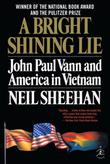Neil Sheehan, the journalist whose A Bright Shining Lie: John Paul Vann and America in Vietnam is considered a classic work of American nonfiction, has died at 84, the New York Times reports.
Sheehan, an Army veteran-turned–journalist, covered the Pentagon and the White House for the Times in the late 1960s and early 1970s. He first came to national prominence in 1971 after whistleblower Daniel Ellsberg granted him access to the Pentagon Papers, a report from the U.S. Department of Defense that revealed the government had lied to the public about the Vietnam War.
 1In 1988, Sheehan published A Bright Shining Lie, which chronicled the career of John Paul Vann, a U.S. Army lieutenant colonel who died in a helicopter crash in Vietnam in 1972. A reviewer for Kirkus wrote of the book, “His canvas is broad, filled with neatly integrated historical information, sharply observed portraits (from policy level on down), tactical and logistic detail, and insightful political analysis, along with the biography of a fascinating and uniquely American character.”
1In 1988, Sheehan published A Bright Shining Lie, which chronicled the career of John Paul Vann, a U.S. Army lieutenant colonel who died in a helicopter crash in Vietnam in 1972. A reviewer for Kirkus wrote of the book, “His canvas is broad, filled with neatly integrated historical information, sharply observed portraits (from policy level on down), tactical and logistic detail, and insightful political analysis, along with the biography of a fascinating and uniquely American character.”
The book won the Pulitzer Prize and the National Book Award. Sheehan would follow it up with two other books, After the War Was Over: Hanoi and Saigon and A Fiery Peace in a Cold War: Bernard Schriever and the Ultimate Weapon.
Admirers of Sheehan paid tribute to him on social media. Documentary filmmaker Ken Burns tweeted, “Meeting Neil Sheehan was one of the joys of making our Vietnam War film. He was the best at what he did—a reporter dedicated to facts a writer who could tell a story. He’ll be greatly missed.”
Michael Schaub is a Texas-based journalist and regular contributor to NPR.































